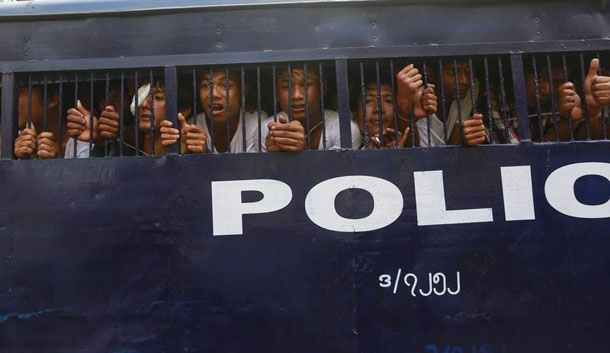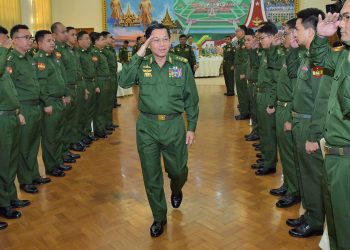RANGOON — In Thursday’s session of the Lower House of Parliament, an Arakan National Party (ANP) lawmaker asked whether the government intends to establish legal definitions for “political prisoners” and “political offenses.”
The issue of officially defining “political prisoners” has been of long-standing concern to political activists and civil society in Burma. Previous military-backed governments—including the administration of President Thein Sein—have dismissed this category, claiming that no one was incarcerated for “political” reasons.
The ANP lawmaker Pe Than took the floor of the chamber, saying that instituting legal definitions for “political offenses” and “political prisoners” would protect political activists from being treated as criminals while in prison, and would also pave the way for reparations to be given to Burma’s many former political prisoners who suffered human rights violations while incarcerated.
Pe Than cited previous governments’ failure to distinguish political from criminal charges, even though many political activists were arrested and imprisoned under Burma’s military regime due to their dissident beliefs.
“It is completely unacceptable in a democratic society that anyone whose activities are motivated by political views contrary to those of the government could be arrested and charged as criminals,” Pe Than said to the chamber.
“Sometimes, [political prisoners] experienced worse treatment than ordinary criminals,” Pe Than said.
During the session, Deputy Minister of Home Affairs Maj-Gen Aung Soe countered that “offenses [made] against the State”—as outlined in several current legal provisions—could not be counted as “political offenses.” He claimed that the two terms had divergent meanings.
Prisons should treat prisoners “equally,” and differentiating between prisoners would amount to “discrimination,” Deputy Minister Aung Soe said.
“Our ministry does not plan to establish definitions for ‘political offenses’ or ‘political prisoners’ since such definitions are not found in any existing laws or in the constitution,” Deputy Minister Aung Soe concluded.
Prisons are administered under the Ministry of Home Affairs, one of three ministries controlled by Burma’s military.
The Assistance Association for Political Prisoners (AAPP), a Thailand-based rights organization promoting the welfare of Burma’s political prisoners, has lobbied for the Burmese government to establish a legal definition for “political prisoner.”
The AAPP contends that anyone who is arrested, detained, or imprisoned for political reasons, or wrongfully under criminal and civil charges, because of his or her perceived or known role in activities promoting freedom, justice, equality, human rights, and civil and political rights, including ethnic rights, should be defined as a political prisoner.
Aung Myo Kyaw, a local representative for the AAPP, said that differentiating prisoners means separating them, not discriminating against or giving special favor to certain prisoners. He said that, without definitions in place, the existence of political prisoners could continue to be vehemently denied by the government.
“Definitions are fundamental to ensuring the recognition of political prisoners, so that we can make sure no one remains in prison because of their political beliefs or activities,” Aung Myo Kyaw told The Irrawaddy.
“Only if these definitions were ratified by the government, rehabilitation and reparation programs for former political prisoners could be implemented,” Aung Myo Kyaw said. He mentioned that many government officials and parliamentarians under the new government had previously faced arrest for political activities, including President Htin Kyaw and State Counselor Aung San Suu Kyi.
The ANP lawmaker Pe Than expressed his dissatisfaction with the response of the Deputy Minister, calling for a fuller response “representing the whole cabinet.” Deputy Minister Aung Soe said he would confer with the Home Affairs Minister, so that the issue could be discussed in the cabinet, before responding further.
According to a recent report from the AAPP and the Former Political Prisoners Society (FPPS), “After Release I Had To Restart My Life From the Beginning,” Burma has had between 7,000 and 10,000 political prisoners since military rule began in 1962.
The National League for Democracy (NLD), which now heads the government, had previously pledged that they would establish a definition for political prisoners once in power, and that they would not arrest anyone for political reasons.
The government released 83 prisoners in an amnesty in April, after the traditional Burmese new-year celebrations. According to the AAPP, 70 were political prisoners.

















